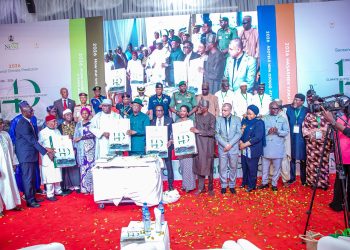By Nkechi Eze
In a landmark move aimed at strengthening road safety, enhancing insurance compliance, and improving emergency medical response for accident victims, the Federal Road Safety Corps (FRSC), the National Insurance Commission (NAICOM), and the National Health Insurance Authority (NHIA) have entered into a strategic collaboration under the Nigerian Insurance Industry Reform Act (NIIRA) 2025.
The partnership was formally sealed on Thursday, October 23, 2025, during a courtesy visit by the Corps Marshal of the FRSC, Shehu Mohammed, to the Commissioner for Insurance, Mr. Olusegun Ayo Omosehin, at the NAICOM Headquarters in Abuja.
Speaking during the visit, the Corps Marshal described the signing and implementation of NIIRA 2025 as a milestone that will transform the insurance and road safety landscape in Nigeria. He called for closer cooperation between both agencies to improve accident response, data exchange, and compensation mechanisms for road users.
“We need a robust data exchange framework between FRSC and NAICOM to ensure prompt accident response and timely compensation to road users,” Mohammed said. “Digitizing our systems will not only improve efficiency but also help eliminate fake motor insurance policies that have plagued the system for years.”
Mohammed commended NAICOM for its ongoing reforms and reaffirmed the FRSC’s readiness to collaborate in creating a national framework that links road safety, insurance compliance, and public health response.
In his remarks, Commissioner for Insurance, Mr. Olusegun Ayo Omosehin, commended the Corps Marshal’s reform-oriented leadership and expressed confidence that the partnership would redefine the operational synergy between the two agencies. He said that the newly enacted NIIRA 2025 had introduced stronger legal provisions for compulsory third-party motor insurance, alongside the creation of a dedicated compensation fund for victims of road crashes.
“NIIRA 2025 has reinforced the compulsory third-party motor insurance policy and created a dedicated fund for accident victims,” Omosehin stated. “The fund will be managed by a multi-agency committee that includes representatives from the FRSC to ensure fairness, transparency, and accountability.”
Also speaking, the representative of the National Health Insurance Authority (NHIA), Mr. Ajodi Nuhu Nasir, hailed the tripartite collaboration as a significant stride towards creating a safer, more responsive, and more humane transport ecosystem.
“This partnership creates a system that not only makes our roads safer but also guarantees prompt and quality medical care for accident victims,” Nasir said. “Through this, we can significantly reduce the morbidity and mortality linked to road crashes.”
At the end of the strategic session, the three agencies agreed on a series of key action points to ensure the effective implementation of their shared objectives under NIIRA 2025.
Among these resolutions is the integration of FRSC and NAICOM’s digital platforms to enable seamless data sharing and efficient tracking of insured vehicles nationwide. The agencies also resolved to jointly develop and implement a nationwide awareness campaign to educate motorists and the general public on the benefits of insurance, road safety, and the new reforms introduced under the Act.
Additionally, a Joint Enforcement Committee will be established to ensure compliance with third-party motor insurance requirements and to clamp down on the circulation of fake insurance policies. The FRSC will incorporate motor insurance verification into its vehicle licensing and enforcement operations, ensuring that only properly insured vehicles are permitted on Nigerian roads.
The agencies affirmed that this collaboration marks a new era in Nigeria’s coordinated efforts to enhance road safety, protect motorists, and guarantee timely medical attention and compensation for accident victims.
A formal date for the inauguration of the Joint Enforcement Committee is expected to be announced soon, as the agencies move to operationalize the landmark partnership under the NIIRA 2025 framework.
















